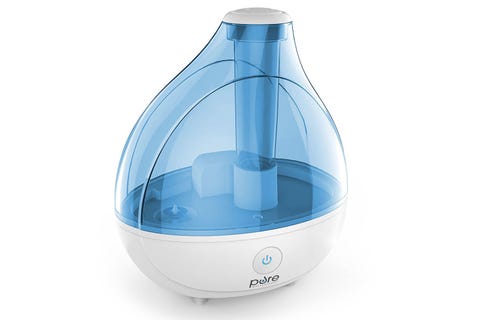First an inflamed red patch appears on your elbows, knees, or hands. Then, the unbearable itchiness leads to scratching — and then that scratching then inflames the skin even more.
A whopping 31.6 million Americans suffer from eczema — that's more than 10% — but no matter how common it is, this group of medical conditions can still pose a challenge. While "eczema" actually breaks down into specific types, the most common kind, atopic dermatitis, is also a chronic one.
"It has to do with immune dysfunction," explains dermatologist Tina Bhutani of the University of California, San Francisco Medical Center. "Patients have an overactive immune system in addition to having a defect in their skin barrier." That biological difference makes the skin both drier and more susceptible to allergens and irritants in the environment, triggering flare-ups.
Whatever type of eczema you're dealing with, there is no definitive "cure." Doctors will often prescribe an oral or topical medication to help soothe inflammation, but Dr. Bhutani says the number one question she gets at her practice is, "What else can I do?"
Luckily, your first line of defense is quite simple. Gentle skincare and a few lifestyle changes may give your body the TLC it needs to get back on track. That dreaded "itch-scratch cycle" might end sooner than you think; find sweet relief with her tips below.
1. Take short, lukewarm showers.
If your fingers prune up, you're likely taking too long. Those extra minutes — especially in hot water — can make it harder for your skin to retain moisture, further drying it out.
2. Use soap sparingly.
"Your skin makes natural soaps," Dr. Bhutani says. "When we use external soap we're overdoing it." She recommends plain, fragrance-free products like Cetaphil Gentle Cleanser or Dove Sensitive Skin Beauty Bar and sudsing only the visibly dirty areas of your body and folds like your armpits and groin.
While you might like the smell of your current body wash, dyes and scents can further trigger irritation.
3. Buy moisturizer that comes in a tub.
The products you scoop out with your fingers is actually thicker than formulas that have to go through a pump. The National Eczema Association recommends CeraVe Healing Ointment and Vaseline Intensive Care Deep Moisture Jelly Cream for keeping your skin moisturized.
SHOP NOW: CeraVe Healing Ointment, $17, target.com
When you get out of the shower or bath, pat your skin with a towel until it's slightly damp. Then seal in the moisture by applying lotion no more than three minutes later. This method — a.k.a. "soak and seal" — will promote better hydration. While you won't get that squeaky-clean feeling, that sensation's actually a sign you've dried out your skin too much, Dr. Bhutani says.
4. Try a bleach bath.
People with atopic dermatitis are prone to infections, so bleach baths (similar to a chlorinated pool) can help disinfect the skin. One or two times a week, add a half cap of bleach to the tub and soak for 10 minutes.
Warning: People with bleach sensitivities or allergic asthmas should consult their doctor before trying this, according to the National Eczema Association. A cup of vinegar added to a full tub may also help reduce the amount of bacteria on the skin.
5. Give coconut oil a shot.
It's not the be-all and end-all, (read: you should still use your prescriptions), but it might help, according to some promising studies. That's likely because coconut oil is shown to have anti-inflammatory and antibacterial properties.
6. Invest in a humidifier.
Since wintertime dry air can trigger flare-ups, keeping the humidity up in your home can will help keep your skin more hydrated. Dr. Bhutani recommends getting one of the cool-air kinds; the MistAire Ultrasonic Cool Mist Humidifier is Amazon's choice with over 8,800 customer reviews.
SHOP NOW: MistAire Ultrasonic Cool Mist Humidifier, $40, amazon.com
7. Monitor your stress levels.
"Stress is huge," Dr. Bhutani says. "There's definitely a connection between the mind and the skin." If a patient's been practicing gentle skincare and using their prescriptions without improvement, she'll often look at this piece of the puzzle. Getting plenty of sleep and addressing worry and anxiety could help improve your skin.
8. Be skeptical of supplements or vitamins.
"There hasn't been any large-scale studies that prove they work," Dr. Bhutani explains. Since nothing helps people across the board and some supplements may make your symptoms worse, it's not necessarily something you want to experiment with.
9. Keep a food diary.
People with eczema are more likely to have food allergies, but Dr. Bhutani says it's hard to connect flare-ups with the diet, especially in adults. Tracking what you eat might make any potential links more clear. If you notice a consistent trigger like eggs, soy, or milk eaten within two days of a flare-up, your derm might refer you to an allergist for further testing.
10. Consider light therapy.
About 70% of people with eczema see improvement with phototherapy, according to the National Eczema Association. Doctors usually administer UVB light once or twice a week for a few minutes at a time. While it's a time commitment, it might be worth it to you if you're still not seeing any positive changes in your skin.









No comments:
Post a Comment